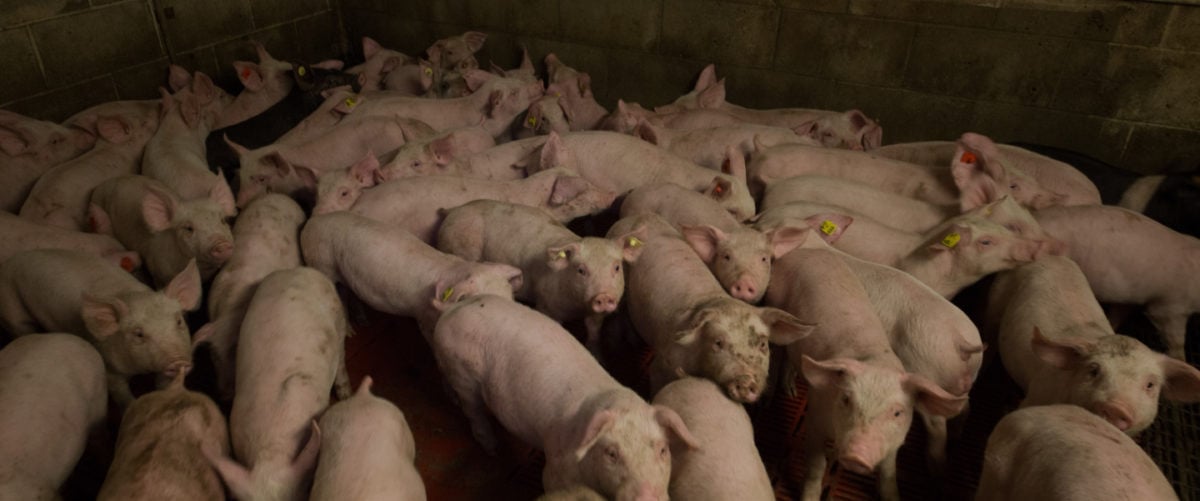Congress Confirms: Smithfield Lied. We Won’t Let Them Get Away With It.
Published Jun 13, 2022

A Congressional investigation published last month confirmed Smithfield lied to the public about pandemic meat shortages and played a central role in weakening federal protections for meatpacking workers.
Last month, Congress’s explosive report revealed how the country’s largest meatpackers lied to the public and endangered their workers. The companies, including pork giant Smithfield Foods, falsely claimed meat shortages. Then they aggressively lobbied the federal government to keep plants running with “glaringly deficient” safety protocols, despite the terrible risk to workers’ lives.
The report’s findings are truly disturbing. But sadly, they are not surprising. In fact, we’ve known that Smithfield was lying from the start, which is why we sued the company last year. Unbelievably, just two days after Congress released its findings, Smithfield demanded that the court dismiss our case. They argued our detailed allegations have no merit — a bold position in the wake of the Congressional report. The investigation documents in painstaking detail just how egregious Smithfield’s lies were. See for yourself — here are just a few excerpts exposing Smithfield’s central role in drumming up panic and endangering workers:
Lie #1: That we were “Perilously Close to the Edge in Terms of our Nation’s Meat Supply.”
“While meatpacking companies—Smithfield and Tyson in particular—asserted that reduced plant operations and worker absenteeism were making the food supply chain ‘vulnerable,’ documents obtained by the Select Subcommittee suggest that this narrative lacked any basis in fact and show that others in the industry believed it was false. For example, on April 12, 2020, Smithfield CEO Ken Sullivan issued a public statement admonishing that the closure of one of its plants was ‘pushing our country perilously close to the edge in terms of our [nation’s] meat supply,’ and would have ‘severe, perhaps disastrous, repercussions for many in the supply chain.’ But just three days later, Smithfield asked their industry representatives to issue a statement that ‘there was plenty of meat, enough that it was [sic] for them to export,’ while Smithfield simultaneously was ‘tell[ing] importers they have enough meat.’ When discussing Sullivan’s statements about the meat supply, meatpacking industry representatives described it as ‘intentionally scaring people,’ ‘whipp[ing] everyone into a frenzy,’ and creating a ‘mess’ that others would have to ‘clean up.’ When meatpacking industry representatives inquired into where any actual shortages were occurring, they were unable to find any.”
Lie #2: That Smithfield has “done everything possible to protect employee health and safety.”
“When meatpacking companies’ attempts to stifle state and local health department regulation did not yield sufficiently comprehensive results, Smithfield and Tyson conceived of a ‘federal directive’ that would ensure state and local health authorities were powerless to impose coronavirus health and safety precautions in the plants. The meatpacking companies drafted and pitched an executive order to the Trump White House, which promptly issued it after less than a week of review and revision. The final order that was eventually issued adopted the themes and statutory directive laid out in the meatpacking industry’s draft, invoking the Defense Production Act (DPA) to ensure meatpacking plants ‘continue operations.’”
“Meatpacking companies and USDA officials sought the ‘critical infrastructure’ designation without first attempting to address the glaringly deficient coronavirus precautions in plants. This conduct is particularly egregious considering that, as discussed above, the nation’s meat supply was not actually at risk.”
Lie #3: That Smithfield wasn’t “unwilling to implement worker protections for the sake of profits.”
The truth is, Smithfield was unwilling from the beginning. They avoided implementing worker protections and worked with federal agencies to keep avoiding them throughout the pandemic. Congress reports that:
“Emails obtained by the Select Subcommittee and statements given during transcribed interviews show that meatpacking companies communicated regularly with USDA regarding USDA’s discussions with CDC and OSHA about coronavirus mitigation guidance and recommendations to ensure they would allow plants to continue operating without critical science-based prevention and mitigation measures.”
One such example centered on an “outbreak [that] occurred in April 2020 in Smithfield’s Sioux Falls, South Dakota plant, which left at least 900 workers infected and two workers dead. When CDC issued recommendations to address the coronavirus outbreak in the facility, the recommendations included precatory language and qualifiers that effectively made the guidance optional for Smithfield. It later came to light that the CDC recommendations had been watered down from an earlier draft that lacked these types of qualifiers.”
“Internal meatpacking company documents obtained by the Select Subcommittee now illustrate how these edits came about—namely, that Smithfield intercepted the draft CDC recommendations, provided extensive comments to CDC, USDA, and the South Dakota Governor’s office, and ultimately succeeded in having CDC water them down before being issued.”
“Even though the guidance had been significantly watered down per Smithfield’s efforts, CEO Ken Sullivan said upon its release that ‘this is worse than nothing’ and a ‘Middle finger from govt.’”
“Smithfield’s changes to CDC’s recommendations had potentially dire consequences for Smithfield’s workers. During the first year of the pandemic, Smithfield saw 9,666 worker infections and 25 worker deaths. Smithfield’s lethal role in weakening federal meatpacking worker protections was not limited to its own employees. The company’s lobbying efforts with respect to the Sioux Falls recommendations carried over into shaping CDC/OSHA guidance for all federally-inspected meatpacking plants.”
What’s Our Next Step?
Our legal team is fighting Smithfield’s attempt to dismiss our case. We won’t let it stop the court from deciding for itself whether Smithfield’s pandemic statements were unlawfully false and misleading. Armed with Congress’ findings, we are confident we can overcome Smithfield’s meritless arguments. Once we do, we will start demanding the company turn over relevant records and witnesses. That’ll allow us to continue building our case and expose Smithfield’s lies for what they are.
We’re holding Smithfield accountable. Help us spread the word.
Enjoyed this article?
Sign up for updates.
TO TOP


